- Home
- Fay Weldon
The Rules of Life
The Rules of Life Read online
The Rules of Life
A Novella
Fay Weldon
STRANGE DAYS INDEED! YOUR narrator, in the year 2004, sits and works at his console within the great portals of the Temple that was once the British Museum, and tries to come to terms with the world, and his life, and the past. Envisage me, if you can, dressed in the white samite, mystic, wonderful, which is worn by the pulp priests of the GNFR, or Great New Fictional Religion: a small elderly male figure, dwarfed by rows upon ranks of the flickering electronic devices which these days bring the voices of the dead to life.
The pinner priests, our seniors in the GNFR hierarchy, also wear white samite but theirs is shot with multicoloured phosphorescent thread, the better to impress the not easily impressed. A strange sight indeed, as they crouch by night in every graveyard in the land, their Sony sensors at the ready, pinning down the ghostly emanations of the dear and not so dear departed—or re-winds as they have come to be called.
I am not as young as I was. I ought by now, with the wisdom of the GNFR at my command, to have achieved contentment, to have learned to acquiesce in my fate, but as my fingers stray over the patterns made by this particular rewind, they tremble. I am full of a longing which can never be satisfied—to touch what is untouchable, but only just; feel what can’t be felt, but once almost was. The dead are more powerful than we suppose, than the pinner priests let on. We are expected to learn wisdom from the re-winds—but who ever learned wisdom from a ghost? Call them what you will, that is all they are.
The ghost of Gabriella Sumpter—for this was her name in life—is registering in an unusual fashion. She wishes, I gather, to discuss the rules of life, as seen from the vantage of hindsight, from a life which includes its death, and does not exclude it. Or so I must judge from the patterns emerging from the console. Here for the first time we have not merely scraps of memory, plus little wafts of resentment and spasms of desire, but some kind of search for understanding and completion. It hurts her: I can tell from her voice, and I don’t want anyone hurt, not even a woman as selfish and morally frail as Gabriella Sumpter.
Well, he who pays the piper calls the tune, and the pinner priests do that, and the pulp priests must submit to their judgement, and to that of the Great Screen Writer In The Sky whose will we all serve, and whose priest—though a humble one—I am. Praise be the GSWITS: press Play and Record: consent!
Gabriella Sumpter first startled me by observing that there were no rules in fiction, and that if she wished to start with her death and end with her birth, she would. She could run life backwards if she wanted; yes, even that. I may say the voice was particularly attractive: light and low, and with just a hint of mirth and more than a hint of wilfulness. After death, voice-age goes back to a median point of about, I should say, thirty-three. Should the pinner priests ever manage a bodily resurrection, I daresay the same phenomenon would apply. Grandpa’s re-wind would rise from his coffin in his vigorous prime. Not always a happy thought! But then—and this perhaps is the reason the GNFR is sweeping the Western World—we do acknowledge that the GSWITS has had many a bad idea in his time. Virtue lies in trying to make the best of His mistakes.
Now. Gabriella Sumpter went on to remark that although in fiction there were no rules, in life there were, and she, who had done so little good in her life except to herself, after her death would now like to help by passing a few on—or rather, back.
She had observed in life that the mass of ordinarily accepted rules—for example, that too many cooks spoil the broth, or if you can’t stand the heat you should get out of the kitchen, or that a woman needs a man as a fish needs a bicycle, were simply not true: mere patterns of words, cement grouting for the shaky constructions of our existence, cosmetic rather than structural. But now she was dead, she had been able to come to a few, she felt, quite sound conclusions. Or Valid Rules, as she liked to call them.
‘I have been dead for three months now,’ she says, ‘and the earth has settled sufficiently for a headstone to be placed on my grave. This is the first of the Valid Rules, an easy one: that headstones must wait for passions to ease; for grief and rage to abate. The earth sinks and settles with the emotions. My little ankle is devoid of flesh; my high round bosom quite denatured; my soft eyes deliquesced and gone. They have written upon the slab Gabriella Sumpter: 1941—2002. R.I.P.’
Well might they inscribe ‘R.I.P.’! How can anyone rest in peace now that the pinner priests lurk by night in every graveyard, with their re-play devices to the ground? I am surprised Gabriella had not asked for cremation, as so many do these days. Not that burning the body destroys the recall voices: but it does at least scramble them to the point of indecipherability. Do we not have enough trouble with the living? Do we have to add the dead to our burdens? But there, the human quest for knowledge is as unrootupable as couch grass in a field. There is no stopping our pinner priests.
Miss Sumpter continues. ‘Could they say of me that mine was a successful life? I think so. I did not marry; I did not have children. That was my great achievement. We cannot escape the destiny of being born—we are, therefore we must be, so the best we can do, while living, is not, by marrying, to burden others with our existence, and not, irresponsibly, by having children, to pass life on. Those are the second and third Rules. There is more than enough life about,’ she says dismissively, ‘and most of it is painful, and the briefer the experience the better.
‘I consider myself fortunate,’ she continues, ‘to have died at 61, in full possession of my faculties, and still capable of inspiring erotic love, the only thing that makes life worth living at all. My step did not have time to falter, my spine did not curve; my eyes had wrinkled but barely dimmed: my teeth, with considerable help from my dentist, Edgar Simpson, remained white, firm, even, and above all there. Edgar Simpson, poor man, loved me quite desperately but I did not return his passion. I know, rationally, that dentists, like vets, are even more highly trained than are doctors, but, unlike doctors, they remain difficult to take seriously in the romantic sense. Theirs seems a primarily manual skill, and of a slightly absurd kind. Yet God knows we need them. Nothing is fair—that is the next of the Valid Rules: perhaps the greatest and most reliable of them all.’
Here Miss Sumpter goes on to complain about the smallness of the earth’s circumference: a mere 24,000 miles. What kind of size is that, she demands, for a whirling stone globe to which so many million people are obliged to cling in their search for meaning. Unbelievably, immorally small! Yet still they insist, clinging head-down to the railway-track of life, listening to the approaching rumble of meaning: lifting their heads, crying ‘it’s coming, it’s coming, the meaning is coming,’ only it never quite does, of course. Some signal is against the train, its driver altogether too responsible, the train slows, stops, fades: death comes before enlightenment. (The dead do mix their metaphors: I am sorry. I think myself the re-recording procedures are more at fault than the re-winds—it doesn’t seem too much to ask that some of the millions which pour daily into the GNFR coffers should go to refining the Technology of Truth. It is in its infancy, not its maturity as some seem to think.)
‘I was buried in a white silk shift,’ Miss Sumpter goes on, when the text has settled down again. ‘I had it specially made by Frieda Martock: her poor old eyes were scarcely fit for the task. She had always been old, even when I was young, as the serving classes tend to be. It was the last thing she did for me. I insisted that she do it by hand: machine-stitching is far too brutal for fine silk; if the thread is strong enough to stand the mechanical pounding it will be strong enough to damage the fabric. Sewing thread must be no thicker than the thread of the stuff to which it is applied: the needle no coarser than its weave. Miss Martock’s hands were painful and
knotted by arthritis: it hurt them to wield the needle. But beauty is created by sacrifice, by pain and suffering. That is something else I have observed. Palaces built by enslaved and miserable serfs are more intricately beautiful, more reflective of human aspiration, than any number of concrete town halls built by well-fed enfranchised time-servers. If there is no sacrifice, the God does not descend. He likes blood. Miss Martock groaned while she worked, and so the shift hung beautifully. I rose from my death bed and tried it on once or twice before I died, and admired myself in it in the mirror, and almost sent a message to say how well she had done; but it does not do to praise too much. People get slack and stop bothering. That is another of the valid rules. Moreover, she had left a loose thread in one of the buttonholes.
‘I died of cancer of the liver. It is not a painful death. One just gets more and more languid, and finally expires. I recommend it.
‘The mirror in which I looked at myself, the better to study Miss Martock’s silk shift, was old and gilt-framed, and the glass mercury-based. I do not like the new ground mirrors, which hate what they see and so distort the truth unpleasantly. I have, or had in my life, no particular appetite for truth: I think what has happened is that the sheer languor of my last living days prevented me from keeping it at bay. Much sheer effort goes into avoiding truth: left to itself, it sweeps in like the tide. This vision which I have, now I am dead, was not mine for most of my life. You now, you listeners to my soul, you pinner priests, have the benefit of my weariness.
‘The house in which I had been living, in which I died, is not up for sale, since it is what’s called a Grace and Favour residence—that is to say in the keeping of the Royal Family to dispose of as they want. Terra Rosa, 21 Marlborough Court, London, NW8, pink-washed, discreet, charming. I wonder who will have it next? Perhaps Timothy Tovey’s eldest son James has a mistress, who could make use of it? I doubt it: he is altogether too boring, and genteel, as are all the children that my lover Timothy Tovey and his wife Janice made. Theirs was not a good mix, genetically. I told him it would be so, when the matter of his marrying Janice first arose: such a tall, pale, wavery woman! Perhaps Timothy Tovey’s mother will have her way in the end, and move into Terra Rosa? She is nearing ninety now. Well, we will see. (The dead see everything. That is all the punishment they need.) But the house is so delightful! A small, pink and white detached double-fronted Georgian villa, with a balconied bedroom over the front door, where in summer breakfasting lovers can sip their morning coffee and not care who sees. Well, I never cared. Timothy Tovey of course did. Mistresses may be known to exist, but not seen publicly to exist. Either his mother Julia would get to hear of it, or his wife Janice, or the passing ambassador of some friendly (or unfriendly) nation catch a glimpse of him. Timothy is in the Diplomatic Service: he cannot afford scandal.
Timothy Tovey was there at my bedside while I died. He left the palace reception where Janice was being awarded some medal or other for her perfectly boring work amongst the underprivileged and came at once. He had witnessed my face in that Little Death often enough: why not now in the great and final one? Poor Timothy: at thirty tall, vigorous and proud, a gorilla of a man, huge-headed, long-armed, with the bright, bright eyes of the very intelligent; and the slow drawl of the overcultivated: at seventy, stooped and haggard—a long time now since he broke every chair he sat upon, made me cry out in fear for the safety of my small bones as he gripped me in our love-making. The cheekbones were still firm and prominent but the flesh caved in greyly beneath them. The jaw still jutted in its obstinate way, but the skin folded unkindly below. (Oh, what age does to us! Listen, I am glad to be dead: hurry, hurry, everyone, to join me!) But still he had the same bleak, bright, sideways look of defiance: now directed at the death which was to divide us, as in the past it had been directed at wives, mothers, children, politicians, prime ministers, kings—everyone who stood between us. He held my hand as I died.
‘Shall I tell you what happened at the moment of death?’
Here I maintain that the pinner priests have failed again. The version is garbled. My superiors maintain that the GSWITS, for his own purpose, does his best to keep this particular matter veiled. But the Great Scriptwriter has an editor himself, does he not, to whom, presumably, representation from we bit-part players in the great drama of the universe can be made? I do not believe that this is heresy: surely we, who have to put up with the pain and torments of the life he has decreed, have a human right to know more. If the GSWITS won’t satisfy us, won’t divulge the plot and purpose, surely those above Him will? The pinner priests say it is not our part so much as to conceive of the GSWITS himself as requiring guidance. But there are many others who think like me—who recognise a B-movie writer for what he is; more of us perhaps than the pinner priests realise.
Miss Sumpter described the moment of death in these terms. Her eyes misted; she was gazing at her hand, held in its turn by her lover’s hand. As she looked, the finger shapes became vague, turned, twisted, entwined and stretched and grew into a handsome, leafless tree on which hung a single fruit—and it was she. The fruit dropped, into something soft, like meadow grass—she imagined that sensation of falling and of being received was the actual moment of death—and as it dropped everything changed; as in the cutting of a film one scene abruptly passes to the next. She was in a long, long corridor; reddish, warm—one wonders whether she describes the birth canal: the reverse journey which must happen, spiritually, as we retreat from life?—and along this corridor she travelled, swiftly and composedly, and with great joy, knowing it was back the way she had come. And, as she passed, person after person stepped from the doors which lined the corridor—friends, some she knew and recognised, others she had forgotten but now remembered. They greeted her, welcomed her, fell in with her—though it no longer seemed her corporeal self, but spirit, soul, which swept along—so that when she reached the end of the endless corridor—it seems all things are possible after death—and stepped out into a great white brilliant space she was, as it were, the concentration of everything she had ever known, everyone she had ever greeted, the sum of every flush of excitement, every effort at communication, every animation she had ever experienced—every emotion now showing its true and finer face; every insult and every humiliation now made good, repented of. It was as if, forgiving others in the sheer pleasure and excitement of their company, she needed no forgiveness herself—and she was in paradise, which was, simply, other people. What was more, it was not boring.
Well, so the pinner priests recorded Miss Sumpter’s account of the experience of death. I must say, myself, that if she is telling the truth, and they have recorded it accurately, she has got off very lightly, considering her behaviour in life.
Of course we in the GNFR do try to avoid the condemnation of others but sometimes it’s hard. Though virtue lies in consenting to the parts allotted to us, and we recognise that, just as some can’t help being victims others can’t help being oppressors, and that the best we can do is help the Great Plot of Life go forward, with all its myriad, myriad sub-plots, sometimes we can’t help shaking our heads in disapproval. Part of me, the unreformed part, still sees Gabriella Sumpter as an adulteress, a woman too selfish, too self-centred to have children, who did nothing useful in all her life, for anyone. Yet, in the terms of the GNFR, she is a saint. She did not stand in the way of events. She went where the script dictated—where Fate led her. The fault must surely be in my comprehension, not in the manner of her living. Bow the head! Assent!
I try, but the thought will not be kept down—perhaps the GNFR is in error. Perhaps, in this world of initials we seem increasingly obliged to inhabit, as the pace of living hots up, as the GSWITS covers more and more pages, yet another initial is needed? The GNFR must become the RGNFR, the Revised Great New Fictional Religion. Am I perhaps the one to bring it about—not too humble, nor too elderly, after all? Gabriella Sumpter has stirred something in me I thought was dead. Oh, all our prayers must go to ensuring happy endi
ngs! Let us simply accept that the GSWITS allocated to us mortals is a mere B-feature writer, with the unhappy tendency of his kind to introduce disasters—cyclones, volcanic eruptions, earthquakes or man-made explosions—to get himself out of plot difficulties. The effort of His creation must therefore be to see that He takes His task seriously, and improves His standards. I will not have it that this is heresy. One day we will come to recognise it—when we have had our fill of Watergates, plummetting Jumbos, Titanics raised, AIDS, Chernobyls—then at last the human race will properly grasp that it is not even a main feature, but some kind of hotchpotch of a supporting fictional exercise. We will be happier when we can accept it. We will have fewer expectations. And I think that then, when the RGNFR is triumphant, when the new race of pinner priests—of which I will be lord—recall the likes of Gabriella Sumpter, it will be with the whiff of sulphur, not the taste of ambrosia. I want her punished. There must be punishment.
Well! Miss Sumpter went on to talk of laundry. In fact at times she seemed more concerned with the rules of laundry than the rules of life.
‘One of my earliest memories’, says Miss Sumpter, ‘was of attending a children’s mass in a crisp white cotton dress trimmed with blue velvet braid. My mother, Emerald Lacey-Sumpter, took great care to see that I was always prettily and appropriately dressed, or rather saw to it that Nanny McGorrah accomplished the task. I must have been five. The sermon was given by Father McCree, a priest with little piggy eyes and a soft mouth. He told us a story of the great and wonderful party which was being given up at the castle, to which all the children, rich and poor, had been invited. (The only condition of entrance was that the child had to arrive at the front door clothed in spotless white.) And how one little girl, properly dressed and on her way to the party, stopped at a bush full of dark-red, luscious blackberries, and was tempted, and pulled a single branch down and carefully, carefully picked one, believing she could eat and not get dirty. But as she let go the branch a cluster of berries brushed the front of her dress and stained it purple, red and black! There was no getting those stains out! The little girl stopped by a brook and did her best, but though the sparkling water ran for a while blood-red, her dress was even messier than before. Weeping and disgraced, and trailing behind the joyous, spotless throng, the poor child stood at the palace gates begging to be let in, but the gatekeeper, sadly and gravely, shook his head and the gate was shut in her face. All the other children went in to endless bliss. Not she!

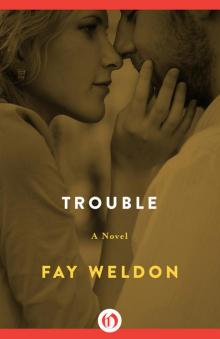 Trouble
Trouble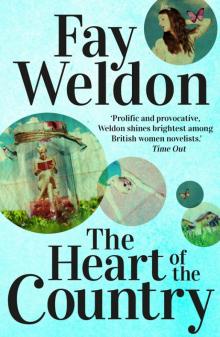 The Heart of the Country
The Heart of the Country Wicked Women
Wicked Women Mischief
Mischief Long Live the King
Long Live the King Remember Me
Remember Me Worst Fears
Worst Fears Chalcot Crescent
Chalcot Crescent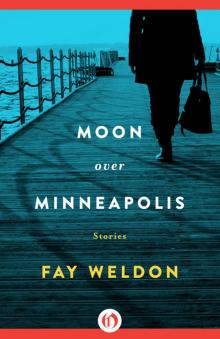 Moon Over Minneapolis
Moon Over Minneapolis The New Countess
The New Countess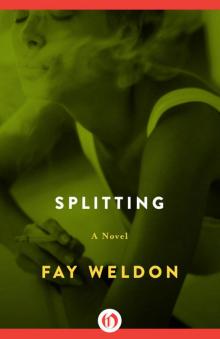 Splitting
Splitting After the Peace
After the Peace Habits of the House
Habits of the House Darcy's Utopia
Darcy's Utopia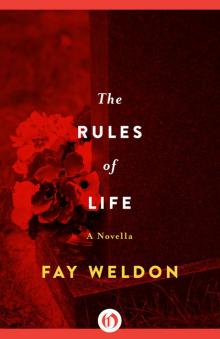 The Rules of Life
The Rules of Life Kehua!
Kehua! Before the War
Before the War Darcy's Utopia: A Novel
Darcy's Utopia: A Novel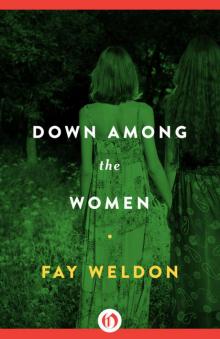 Down Among the Women
Down Among the Women Letters to Alice
Letters to Alice 3 Great Historical Novels
3 Great Historical Novels Female Friends
Female Friends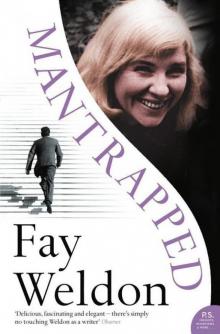 Mantrapped
Mantrapped The Bulgari Connection
The Bulgari Connection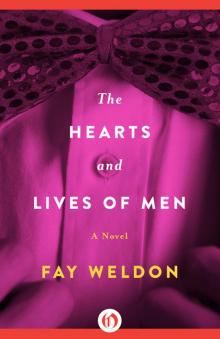 The Hearts and Lives of Men
The Hearts and Lives of Men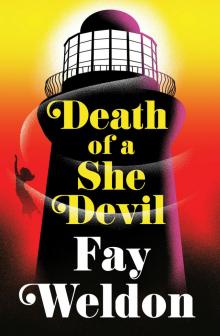 Death of a She Devil
Death of a She Devil